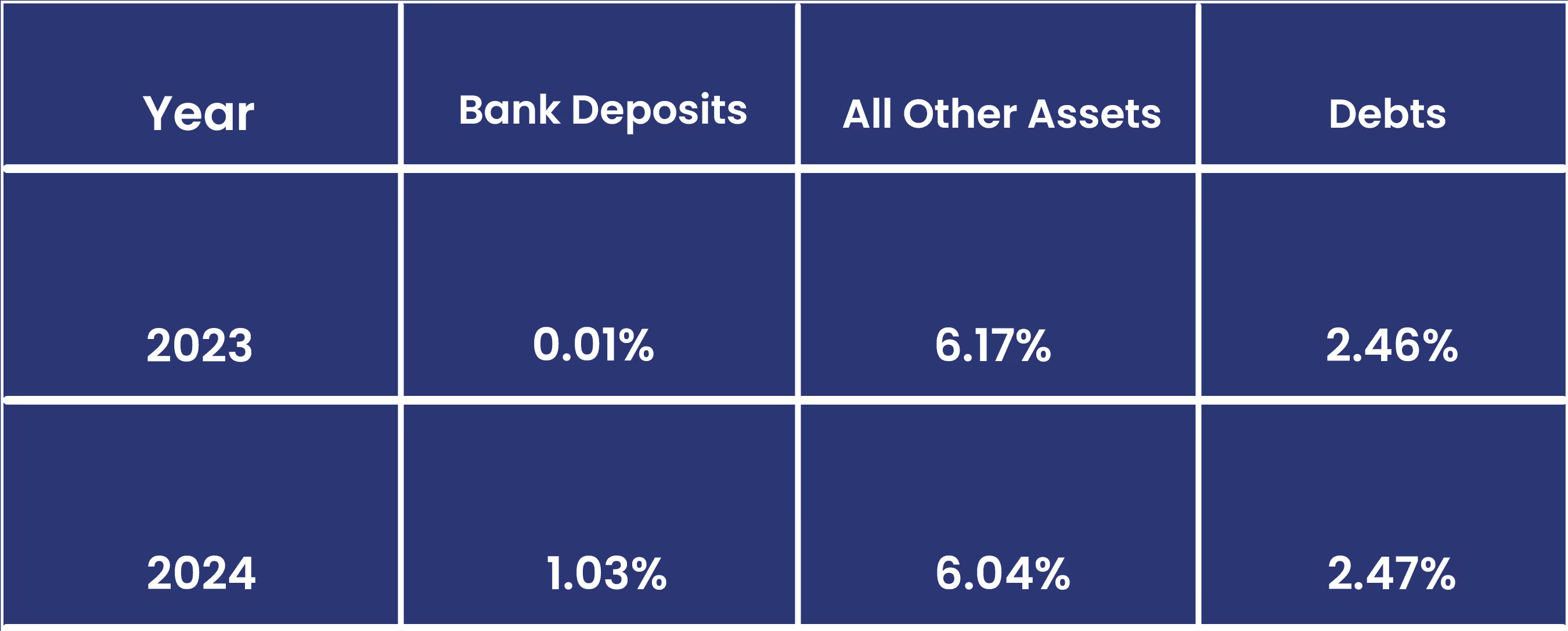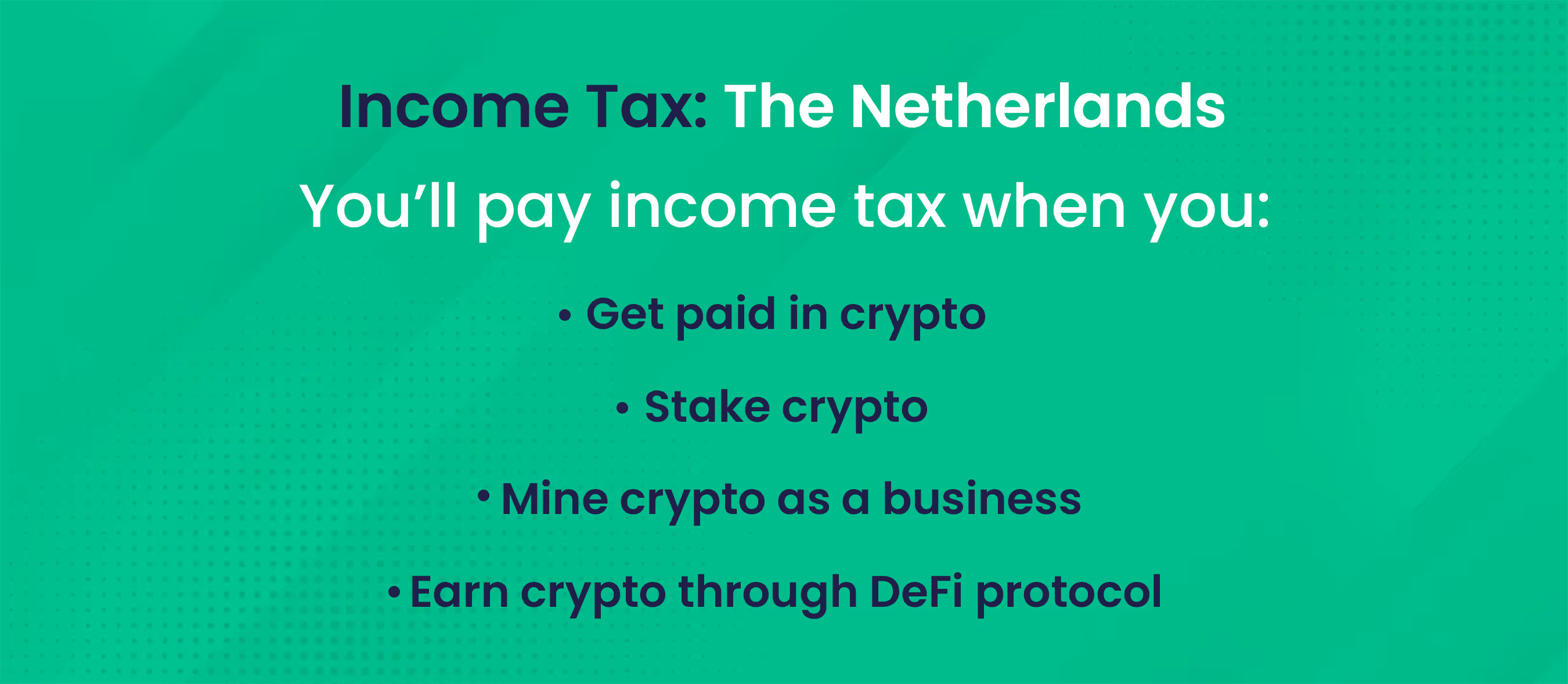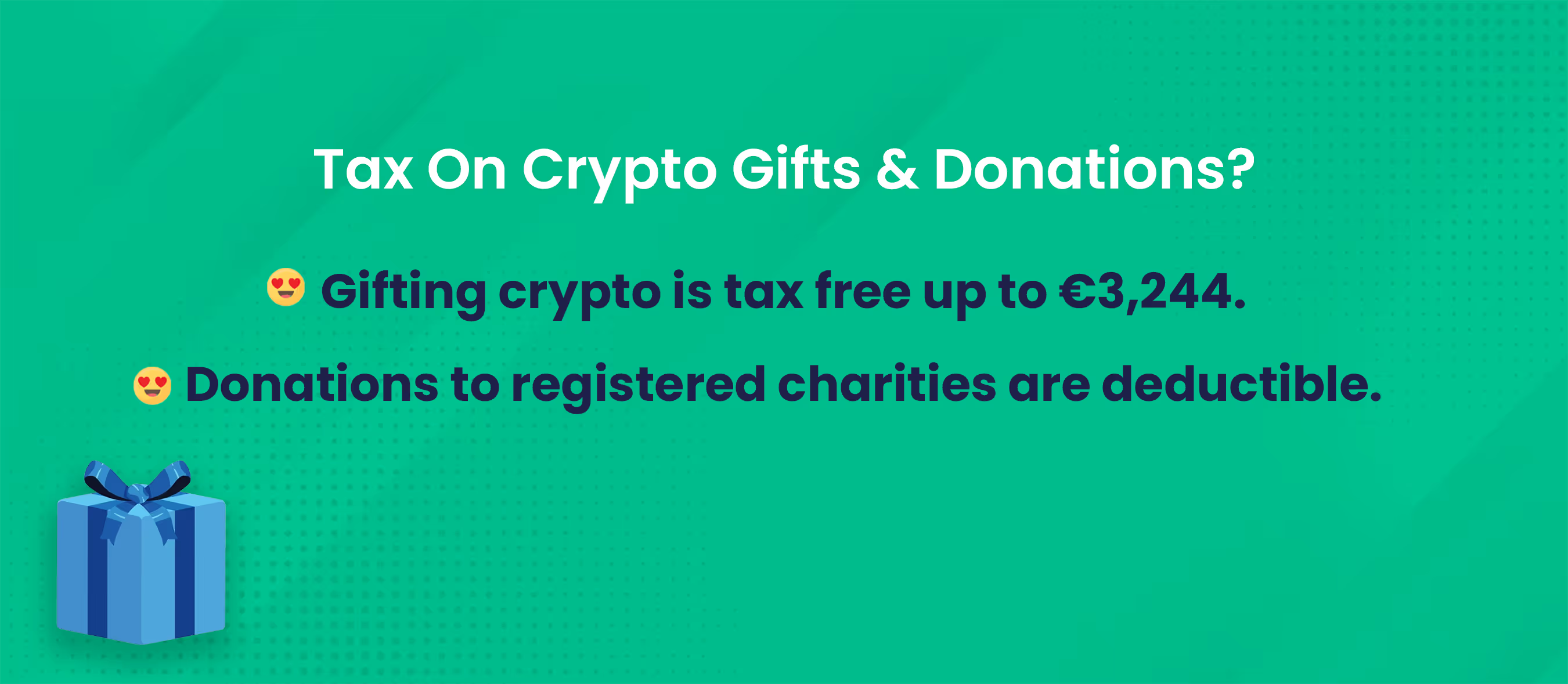.avif)
Calculate Your Crypto
Taxes in Minutes
Crypto taxes can be really stressful and in the Netherlands it’s TRICKY!
But worry not, we are here to clear all the confusion. In this comprehensive guide, we've meticulously covered everything you need to know about Dutch crypto tax in 2024.
This Year, The Dutch Tax and Customs Administration, known as Belastingdienst, is adapting to the dynamic nature of the crypto market.
Whether you are a seasoned crypto investor or just dipping your toes into digital assets, this guide will delve into the key aspects of crypto taxation in the Netherlands, providing clarity on how it works and what you need to know to stay tax compliant.

Is Crypto Taxed in The Netherlands?
Yes, cryptocurrency is indeed taxed in the Netherlands. The Belastingdienst considers crypto as a taxable asset, akin to stocks. This classification has significant implications for how your crypto holdings are taxed in the country.
Can The Belastingdienst Track Your Crypto?
Absolutely. The Belastingdienst has the capability to track cryptocurrency. Crypto exchanges, both large and small, are obligated to furnish customer information to the Belastingdienst upon request.
The upcoming EU directive, Dac8, further strengthens the authority of the Belastingdienst, allowing them to scrutinize crypto companies' accountancy much like they do with traditional banks and pension funds.
How is Crypto Taxed in the Netherlands?
In the Netherlands, the taxation of cryptocurrency follows a unique approach compared to many other countries. Unlike systems employing Capital Gains Tax, the Dutch tax framework focuses on the presumed increase in the value of assets, including cryptocurrency, based on the fair market value on January 1st of each year.
Box System and Vermogensrendementsheffing
The Dutch tax system divides taxable income into three categories, each with its specific tax rate. Crypto assets fall under Box 3, known as Vermogensrendementsheffing. Here's a brief overview of the three tax boxes:
- Box 1: Income from employment.
- Box 2: Substantial interest.
- Box 3: Presumed income from assets, savings, and investments.
However, there's a twist – in specific cases, you'll report crypto in Box 1 in the following cases:
- If you have insider trading knowledge.
- If you're into day trading.
- If you engage in crypto mining (not on a hobby level).
Vermogensrendementsheffing Rates
In Box 3, taxpayers are required to pay tax on the presumed returns from their overall assets. The Belastingdienst, the Dutch Tax and Customs Administration, assumes that individuals will make gains from their assets, never incurring losses. The taxation is based on a fixed percentage of the total value of assets, regardless of actual profits or losses.
Wondering about taxes in the Netherlands?
The Belastingdienst calculates a 'fictitious return' based on your assets. Your assets' total value, minus allowable debts, determines this. You'll be paying 32% tax on the assumed return from your total asset value. Let's delve into the details.
Tax Calculation - Understanding Fictitious Gains
Tax calculations can be Stressful, especially when terms like "fictitious gains" come into play. In this guide, we'll break down the process step by step to help you grasp how to calculate your tax and demystify the concept of fictitious gains.
What are Fictitious Gains?
Fictitious gains hinge on the idea that as your wealth increases, so do the presumed returns on that wealth. This system operates on a progressive tax scale, ranging from a minimal 0.01% to a maximum of 6.17%. However, it's essential to note that this system is set to be phased out by 2027.
Little complex, but let's simplify it. In each category, there's a designated percentage yield. These percentages are then averaged based on the assets you own. This weighted average yield is then applied to the total assets exceeding the personal exemption limit of €57,000. This calculation determines the taxable benefit, which is subject to a fixed tax rate of 32%.
Understanding the Calculation Method
Starting from January 2023, your assets will fall into one of three categories: bank deposits, other assets, or debts. The percentage yield for each category is a key factor in determining the taxable benefit.
Here's a breakdown of the deemed yields for 2023 and 2024:

Let's illustrate the process with an example:
Total Assets: You have €60,000 in assets that you need to consider for fictitious gains tax.
Exemption Limit: The personal exemption limit for 2023 is €57,000. Subtract this from your total assets: €60,000 - €57,000 = €3,000.
Category and Percentage Yield: Let's say all your assets fall under the "All Other Assets" category. For 2023, this category has a percentage yield of 6.17%.
Assumed Return Calculation: Apply the percentage yield to the remaining €3,000.
Assumed Return = €3,000 * 6.17% = €185.10
Taxable Benefit Calculation: Apply a fixed tax rate of 32% to the assumed return.
Taxable Benefit = €185.10 * 32% = €59.23
So, in this example, you would be taxed on a presumed gain of €65.35 based on the fictitious gains system.
What Are the Other Crypto Earnings Taxed Under Box 3?
Apart from the presumed returns, other crypto earnings, such as those from airdrops or hard forks, are declared under Box 3. Understanding the diverse sources of crypto income is essential for precise tax reporting.
Will You Get Taxed for Holding Crypto?
Yes, holding crypto in the Netherlands incurs taxation. Unlike some countries where taxation is triggered only upon selling, trading, spending, or gifting crypto, the Dutch tax office assumes a return from your assets and taxes you accordingly.
Will You Pay Tax on All Crypto Gains?
In the Netherlands, taxes are not imposed on realized gains from crypto transactions; instead, they are based on the presumed return from your holdings on January 1st at 00:00 am. This unique approach differentiates Dutch crypto taxation from that of many other nations.
Income Tax on Crypto
Crypto is taxed as income for employment (Box 1) in the Netherlands when you receive crypto as a salary, earn staking rewards, participate in liquidity pools, mine tokens as a business, or earn DeFi interest.

Mining Crypto Tax
Mining cryptocurrency in the Netherlands can be considered either a hobby or a full-fledged business, depending on factors such as the:
- Degree of activity
- Consistency of profit
- Commerciality
Mining as a Hobby
If mining is pursued as a hobby, it falls under the same taxation category as holding crypto as an asset (Box 3). The assumption is that, as a hobbyist, consistent profits are not being made.
Mining as a Business
If mining is conducted as a business with consistent profits, it is taxed as income (Box 1), with rates varying between 36.97% and 49.50%, depending on the earnings. Check the income tax breakdown here.
How is Crypto Day Trading Taxed?
Trading cryptocurrencies in the Netherlands is akin to trading in traditional currencies. Profits from trades do not need to be declared, offering flexibility to crypto day traders.
How is DeFi Taxed in the Netherlands?
DeFi (Decentralized Finance) is a rapidly evolving space, and the Belastingdienst has yet to issue clear guidelines. While specific guidance is lacking, it's crucial for those heavily involved in DeFi transactions to interpret existing crypto tax rules and apply them appropriately.
If you earn significantly from DeFi in the Netherlands, seeking advice from an experienced tax accountant is advisable, given the unique nature of DeFi income sources.
Examples of DeFi Transactions:
- Earning interest through yield farming on lending protocols like AAVE and Compound.
- Obtaining new liquidity pool tokens, governance or reward tokens on platforms like Uniswap.
- Lending crypto to platforms like NEXO to earn interest.
- Earning crypto dividends on platforms like CoinRabbit.
Will You Pay Tax When Buying Crypto in The Netherlands?
No, buying crypto itself does not incur taxation. Instead, taxes are based on the collective value of your assets at the beginning of the tax year (January 1st).
Will You Pay Tax When You Sell Crypto?
The act of selling crypto, also known as 'disposal,' doesn't attract direct taxes on gains in the Netherlands. However, taxes are levied on the total value of savings and investments at the start of the tax year (January 1st). Large disposals that contribute to savings are included in the wealth tax calculation.
Will I Be Taxed If I Transfer Crypto?
Transfers between different cryptocurrencies or to fiat currency do not incur separate taxes. Whether you trade BTC for ETH, or ETH for euros, The focus remains on the collective value of assets at the beginning of the tax year which is January 1st
Will I Be Taxed If I Gift or Receive a Crypto Gift?
In the Netherlands, the taxation of crypto gifts involves considerations related to the value of the gift and the relationship between the giver and the receiver. Here are the key points to understand:
Tax-Free Thresholds
- Individual Gift: For individual gifts, including crypto, up to €3,244, the transaction is generally tax-free.
- Parental Gifts: If the gift is received from parents, the tax-free threshold is more than doubled, reaching €6,604.
Are There Taxes on Donations to a Registered Charity?
Charitable donors in the Netherlands can deduct the value of their donations from taxable income, provided the charity is registered as a public benefits organization (ANBI). Donations below 10% of annual taxable income are tax-free.

Do You Still Pay Tax on Lost or Stolen Crypto?
Lost or stolen crypto can be deducted from your tax return, but proper documentation proving your previous ownership is key.
When Do You Have to Pay Tax on Crypto in The Netherlands?
The Dutch tax season kicks off on March 1st, allowing individuals to file returns through the online tax portal MijnBelastingdienst.
The deadline for filing is May 1st.
Declaration of crypto and relevant assets must align with their values on January 1st.
What is the Cost Basis in The Netherlands?
In the Netherlands, the cost basis is determined by the value of assets at the beginning of the tax year, specifically at 00:00 on January 1st. This fixed reference point, irrespective of subsequent value fluctuations, is critical for error-free tax reporting.
Benefits of Using Crypto Software App Like Kryptos
To simplify the complex process of calculating and reporting crypto taxes, consider using specialized crypto tax software like Kryptos. With integration of over 3000+ DeFi protocols, 100+ exchanges and wallets, and 50+ blockchains, Kryptos is set to simplify crypto tax.
How to Use a Crypto Tax App Like Kryptos
Using a crypto tax app like Kryptos is a straightforward process:
- Sign up for a FREE Kryptos account: Registration takes only a minute.
- Select your base country and currency: Choose 'The Netherlands' and 'Euros.'
- Connect Kryptos to your wallets, exchanges, or blockchains: Kryptos integrates with over 3000+ DeFi protocols for comprehensive tracking. Check all crypto integrations here.
- Let Kryptos crunch the numbers: The app calculates the cost basis for each crypto asset, along with capital gains or losses and other relevant financial aspects.
- Ta-da! Your data is collected, and your full tax report is generated: Explore your tax summary on the Kryptos platform.
- Download your crypto tax report: Upgrade to a paid plan for downloading the Complete Tax Report or the End of Year Holdings Report, ideal for Dutch investors.
- Send your report to your accountant or complete your Tax Return yourself: Utilize the generated file for your Self Assessment Tax Return or share it with your accountant for a seamless tax filing process.
Disclaimer:
The content in this blog post serves as general information and is provided to the best of our knowledge. It does not assert absolute correctness or accuracy. For precise details on crypto regulations, we suggest consulting with a certified legal advisor in your specific country. Should any inquiries arise, don't hesitate to reach out to us through our social media channels.
FAQs
1. Is Crypto Taxed in The Netherlands?
Yes, cryptocurrency is indeed taxed in the Netherlands. The Belastingdienst considers crypto as a taxable asset, similar to stocks. This classification has significant implications for how your crypto holdings are taxed in the country.
2. Can The Belastingdienst Track Your Crypto?
Absolutely. The Belastingdienst has the capability to track cryptocurrency. Crypto exchanges are obligated to furnish customer information to the Belastingdienst, and upcoming EU directive Dac8 further strengthens their authority to scrutinize crypto companies' accountancy.
3. How is Crypto Taxed in the Netherlands?
In the Netherlands, the taxation of cryptocurrency follows a unique approach. The Dutch tax framework focuses on the presumed increase in the value of assets, including cryptocurrency, based on the fair market value on January 1st of each year, utilizing the Box System and Vermogensrendementsheffing.
4. How Much Tax Do You Need to Pay in The Netherlands?
The Belastingdienst calculates a 'fictitious return' based on the net value of your assets minus allowable debts. You're then liable to pay 32% tax on this presumed return. Let's break down how this works and what it means for your financial landscape.
5. What Are the Other Crypto Earnings Taxed Under Box 3?
Apart from presumed returns, other crypto earnings like those from airdrops or hard forks are declared under Box 3. Understanding the diverse sources of crypto income is essential for valid tax reporting.
All content on Kryptos serves general informational purposes only. It's not intended to replace any professional advice from licensed accountants, attorneys, or certified financial and tax professionals. The information is completed to the best of our knowledge and we at Kryptos do not claim either correctness or accuracy of the same. Before taking any tax position / stance, you should always consider seeking independent legal, financial, taxation or other advice from the professionals. Kryptos is not liable for any loss caused from the use of, or by placing reliance on, the information on this website. Kryptos disclaims any responsibility for the accuracy or adequacy of any positions taken by you in your tax returns. Thank you for being part of our community, and we're excited to continue guiding you on your crypto journey!
| Step | Form | Purpose | Action |
|---|---|---|---|
| 1 | 1099-DA | Reports digital asset sales or exchanges | Use to fill out Form 8949. |
| 2 | Form 1099-MISC | Reports miscellaneous crypto income | Use to fill out Schedule 1 or C. |
| 3 | Form 8949 | Details individual transactions | List each transaction here. |
| 4 | Schedule D | Summarizes capital gains/losses | Transfer totals from Form 8949. |
| 5 | Schedule 1 | Reports miscellaneous income | Include miscellaneous income (if not self-employment). |
| 6 | Schedule C | Reports self-employment income | Include self-employment income and expenses. |
| 7 | Form W-2 | Reports wages (if paid in Bitcoin) | Include wages in total income. |
| 8 | Form 1040 | Primary tax return | Summarize all income, deductions, and tax owed. |
| Date | Event/Requirement |
|---|---|
| January 1, 2025 | Brokers begin tracking and reporting digital asset transactions. |
| February 2026 | Brokers issue Form 1099-DA for the 2025 tax year to taxpayers. |
| April 15, 2026 | Deadline for taxpayers to file their 2025 tax returns with IRS data. |
| Timeline Event | Description |
|---|---|
| Before January 1, 2025 | Taxpayers must identify wallets and accounts containing digital assets and document unused basis. |
| January 1, 2025 | Snapshot date for confirming remaining digital assets in wallets and accounts. |
| March 2025 | Brokers begin issuing Form 1099-DA, reflecting a wallet-specific basis. |
| Before Filing 2025 Tax Returns | Taxpayers must finalize their Safe Harbor Allocation to ensure compliance and avoid penalties. |
| Feature | Use Case Scenario | Technical Details |
|---|---|---|
| Automated Monitoring of Transactions | Alice uses staking on Ethereum 2.0 and yield farming on Uniswap. Kryptos automates tracking of her staking rewards and LP tokens across platforms. | Integrates with Ethereum and Uniswap APIs for real-time tracking and monitoring of transactions. |
| Comprehensive Data Collection | Bob switches between liquidity pools and staking protocols. Kryptos aggregates all transactions, including historical data. | Pulls and consolidates data from multiple sources and supports historical data imports. |
| Advanced Tax Categorization | Carol earns from staking Polkadot and yield farming on Aave. Kryptos categorizes her rewards as ordinary income and investment income. | Uses jurisdiction-specific rules to categorize rewards and guarantee compliance with local tax regulations. |
| Dynamic FMV Calculation | Dave redeems LP tokens for Ethereum and stablecoins. Kryptos calculates the fair market value (FMV) at redemption and during sales. | Updates FMV based on market data and accurately calculates capital gains for transactions. |
| Handling Complex DeFi Transactions | Eve engages in multi-step DeFi transactions. Kryptos tracks value changes and tax implications throughout these processes. | Manages multi-step transactions, including swaps and staking, for comprehensive tax reporting. |
| Real-Time Alerts and Updates | Frank receives alerts on contemporary tax regulations affecting DeFi. Kryptos keeps him updated on relevant changes in tax laws. | Observe regulatory updates and provide real-time alerts about changes in tax regulations. |
| Seamless Tax Reporting Integration | Grace files taxes using TurboTax. Kryptos integrates with TurboTax to import staking and yield farming data easily. | Direct integration with tax software like TurboTax for smooth data import and multi-jurisdictional reporting. |
| Investor Type | Impact of Crypto Tax Updates 2025 |
|---|---|
| Retail Investors | Standardized crypto reporting regulations make tax filing easier, but increased IRS visibility raises the risk of audits. |
| Traders & HFT Users | To ensure crypto tax compliance, the IRS is increasing its scrutiny and requiring precise cost-basis calculations across several exchanges. |
| Defi & Staking Participants | The regulations for reporting crypto transactions for staking rewards, lending, and governance tokens are unclear, and there is a lack of standardization for decentralized platforms. |
| NFT Creators & Buyers | Confusion over crypto capital gains tax in 2025, including the taxation of NFT flips, royalties, and transactions across several blockchains. |
| Crypto Payments & Businesses | Merchants who take Bitcoin, USDC, and other digital assets must track crypto capital gains for each transaction, which increases crypto tax compliance requirements. |
| Event | Consequences | Penalties |
|---|---|---|
| Reporting Failure | The tax authorities can mark uncontrolled revenues and further investigate. | Penalty fines, interest on unpaid taxes and potential fraud fees if they are deliberately occurring. |
| Misreporting CGT | Misreporting CGT Error reporting profits or losses can trigger the IRS audit. | 20% fine on under -ported zodiac signs, as well as tax and interest. |
| Using decentralized exchanges (DEXs) or mixers without records | The IRS can track anonymous transactions and demand documentation. | Possible tax evasion fee and significant fine. |
| Disregarding Bitcoin mining tax liabilities | Mining reward is considered taxable income, and failure of the report can be regarded as tax fraud. | Further tax obligations, punishment and potential legal steps. |
| Foreign crypto holdings: Non-disclosure | Foreign-accepted crypto FATCA may be subject to reporting rules. | Heavy fines (up to $ 10,000 per fracture) or prosecution for intentional non-transport. |
File Your Crypto Tax in Minutes











